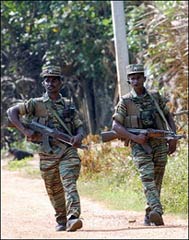Sri Lanka tigers are ready for resumption of war
A senior Tamil Tiger rebel leader said Tuesday that surging violence in Sri Lanka has turned into a "low-intensity war," and his guerrillas are ready if the nation plunges back into full-scale civil war. One person was killed and two policemen were injured Tuesday in two anti-personnel mine blasts intended for a Sri Lankan army convoy, the military said. The spiraling violence, which has killed dozens in recent days, has raised fears that a 2002 cease-fire could collapse, re-igniting a civil war.

"It is a very worrying situation," Seevaratnam Puleedevan, a top Tamil Tiger leader, said by satellite phone from the rebel stronghold of Kilinochchi in the north. "A low-intensity war is already going on, there are lot of civilians being killed in the military-controlled areas in the whole northeast. If the war is thrust upon us, then we are ready to retaliate," said Puleedevan, who heads the Tigers' peace secretariat, set up after the cease-fire to facilitate the peace process.
The government has denied targeting civilians, saying its actions are defensive, and blamed the Tigers for the surging violence. A suicide bomber targeted the army chief last month and rebel suicide boats brazenly attacked a naval convoy last week, killing dozens. An American envoy met with Sri Lankan leaders and representatives of the Tamils, urging both parties to return to the peace process, U.S. Embassy spokesman Philip Frayne said Tuesday.
During a two-day visit, Donald Camp, a deputy assistant secretary at the U.S. State Department, met with Sri Lanka's foreign and defense ministers and with leaders of the Tamil National Alliance party largely seen as the proxy of the Tamil Tiger rebels, Frayne said. Camp praised the Sri Lankan government for its "restraint in the face of (Tiger) provocations but at the same time encouraged the government to fulfill its pledge to investigate violence against civilians," Frayne said.
The violence has killed more than 180 people since April, according to figures compiled by The Associated Press, jeopardizing Norwegian mediators' efforts to revive the peace process. Dozens of killings have occurred under shadowy circumstances, with each side blaming the other. Most prominent was the killing of at least eight Tamil civilians, including a 4-month-old baby, a 4-year-old boy and their parents, by unidentified gunmen in their home in the village of Allaipiddy on northern Jaffna peninsula on Saturday.
Liberation Tigers of Tamil Eelam rebels said navy forces surrounded the house and opened fire. But the government denied any military involvement and blamed the killings on the Tigers. Chief cease-fire monitor Ulf Henricsson said Monday his team was investigating the killings.
Meanwhile, the pro-rebel Tamil Guardian newspaper condemned the international community for what it called the silence over the killings, which would only "embolden" the Sri Lankan military which is "abducting and killing people with impunity," said the London-based newspaper in its latest editorial. Two anti-personnel mines intended for Sri Lankan military vehicles exploded prematurely Tuesday, killing a village guard and wounding two policemen in the country's restive northeast, the military said. The Defense Ministry said a convoy was to travel along the road hours later near the port town of Trincomalee about 230 kilometers (140 miles) northeast of the capital, Colombo.
Anti-personnel mines, which can be detonated by remote control, are the preferred weapons of the Tamil Tiger rebels, who began fighting in 1983 to create a homeland for the country's 3.2 million ethnic Tamil minority in the country's north and east, claiming discrimination by the majority Sinhalese, reports the AP.
N.U.
Subscribe to Pravda.Ru Telegram channel, Facebook, RSS!


